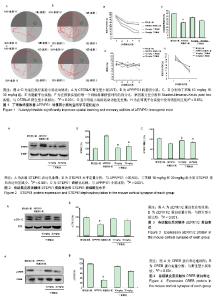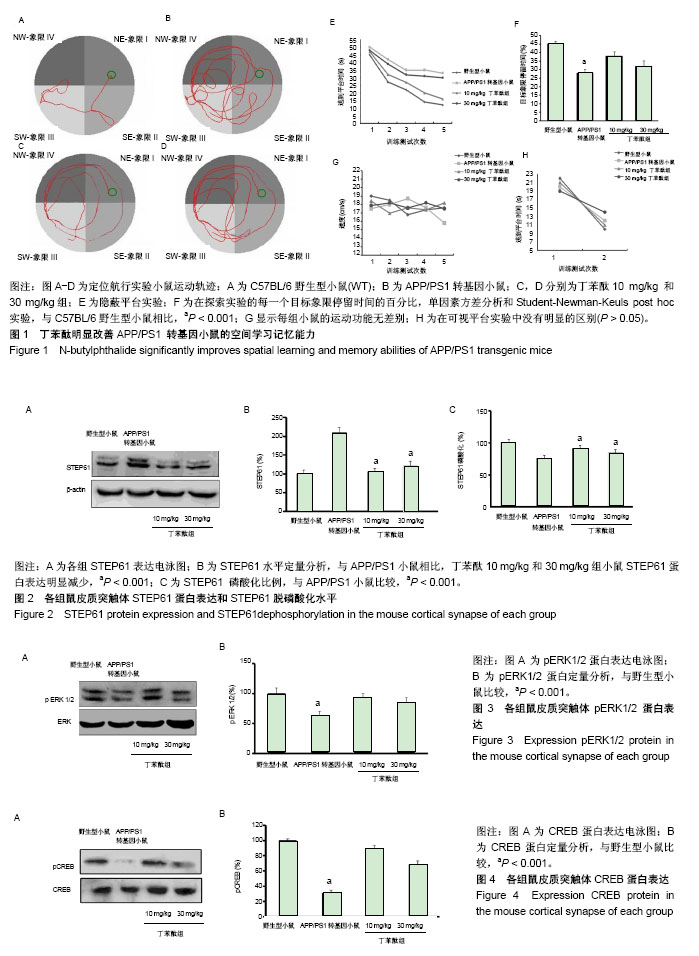Chinese Journal of Tissue Engineering Research ›› 2019, Vol. 23 ›› Issue (在线): 1-6.doi: 10.3969/j.issn.2095-4344.1182
N-butylphthalide affects cognitive function of APP/PS1 transgenic mice (Alzheimer’s disease model)
Zhang Lin1, Liu Jinjie1, Zhao Yan2, Liu Yi1, Lin Jianwen1
- (1Department of Neurology, Dalian Central Hospital of Dalian Medical University, Dalian 116000, Liaoning Province, China; 2Life Science Institute of Jinzhou Medical University, Jinzhou 121001, Liaoning Province, China)
-
Received:2018-12-27Online:2019-03-28Published:2019-03-28 -
Contact:Zhang Lin, Department of Neurology, Dalian Central Hospital of Dalian Medical University, Dalian 116000, Liaoning Province, China -
About author:Zhang Lin, MD, Chief physician, Department of Neurology, Dalian Central Hospital of Dalian Medical University, Dalian 116000, Liaoning Province, China -
Supported by:the Medical Science Research Program of Dalian, No. 171102 (to ZL)
CLC Number:
Cite this article
Zhang Lin1, Liu Jinjie1, Zhao Yan2, Liu Yi1, Lin Jianwen1. N-butylphthalide affects cognitive function of APP/PS1 transgenic mice (Alzheimer’s disease model) [J]. Chinese Journal of Tissue Engineering Research, 2019, 23(在线): 1-6.
share this article
Add to citation manager EndNote|Reference Manager|ProCite|BibTeX|RefWorks

2.1 实验动物数量分析 实验选用APP/PS1转基因小鼠30只,C57BL/6野生型小鼠10只,实验过程无脱失,全部进入结果分析。 2.2 丁苯酞可显著改善阿尔茨海默病转基因小鼠空间学习记忆能力 见图1。 在定位航行实验中,APP转基因小鼠寻找平台的潜伏期明显增加,与同龄野生型小鼠相比较有显著性差异,结果表明APP转基因小鼠对水迷宫学习和记忆的获取能力明显受损,见图1A,B。而两者的平均游泳速度没有明显差异,这表明APP转基因小鼠没有运动能力的缺损,图1E-H。 在空间探索实验中,APP转基因小鼠花费在目标象限的时间明显减少,与同龄野生型小鼠相比较有显著性差异,表明APP转基因小鼠对水迷宫空间认知和记忆能力明显受损。在隐蔽平台实验中,APP/PS1 转基因小鼠比野生型小鼠有更长的逃避潜伏期。而两者花费在目标象限的时间在可视平台实验中没有明显的差别,这表明APP转基因小鼠没有视觉能力的缺损。总的来说12月龄APP转基因小鼠表现出明显的海马依赖的学习和记忆能力的缺损,见图1E,F。最后1次训练的24 h后转基因小鼠与野生型相比在目标象限中花费的时间更少。每天给予10和30 mg/kg丁苯酞可以明显改善APP/PS1转基因小鼠学习记忆的缺损。 由于有非常显著的药物效应,对逃避潜伏期数据进行了分析。首先,与C57BL/6小鼠相比,APP/PS1小鼠的逃避潜伏期明显受损(P < 0.001),说明APP/PS1小鼠存在明显学习记忆缺陷;同时,发现10 mg/kg丁苯酞处理的APP/PS1小鼠与C57BL/6小鼠相比,在逃避潜伏期上无显著差异(P < 0.05;见图1F)。说明每天给药10 mg/kg或 30 mg/kg丁苯酞可明显减轻APP/PS1所致的学习障碍。 2.3 丁苯酞显著降低转基因小鼠的STEP61水平 12月龄APP/PS1转基因小鼠的脑皮质突触小体STEP61蛋白水平是同龄野生型小鼠的203%(P < 0.001)。给予APP/PS1小鼠每天10 mg/kg或30 mg/kg丁苯酞灌胃,可检测到STEP61磷酸化比例在皮质突触小体表达量较APP/PS1小鼠增加,尤其是10 mg/kg丁苯酞处理组(P < 0.01,见图2)。2.4 丁苯酞可增加β淀粉样蛋白介导的ERK和CREB磷酸化水平 实验检测到APP/PS1转基因小鼠皮质pERK1/2和pCREB水平较正常小鼠明显减少(61.82%,30.5%,P < 0.001),见图3,4。给予APP/PS1小鼠每天10 mg/kg或 30 mg/kg丁苯酞灌胃后,明显增加了pERKs和pCREB水平,尤其是10 mg/kg丁苯酞处理组(P < 0.05)。作者之前的结果表明STEP61负性调控了β淀粉样蛋白介导的ERK1/2和CREB磷酸化水平和可能的活性(P < 0.01),提示丁苯酞可以调控STEP/ERK/CREB通路。"

| [1] Dayan AD.Quantitative histological studies on the aged human brain. II. Senile plaques and neurofibrillary tangles in senile dementia (with an appendix on their occurrence in cases of carcinoma). Acta Neuropathol. 1970;16(2):95-102.[2] Grundke-Iqbal I,Iqbal K,Tung YC, et al. Abnormal phosphorylation of the microtubule-associated protein tau (tau) in Alzheimer cytoskeletal pathology. Proc Natl Acad Sci U S A.1986;83:4913-4917.[3] Kowall NW, Beal MF, Busciglio J, et al.An in vivo modelfor the neurodegenerative effects of beta amyloid and protection by substance P.Proc Natl Acad Sci U S A.1991;88:7247-7251.[4] Hardy J, Selkoe DJ.The amyloid hypothesis of Alzheimer's disease: progress and problems on the road to therapeutics. Science.2002;297:353-356.[5] Lue LF, Kuo YM, Roher AE,et al. Soluble amyloid beta peptide concentration as a predictor of synaptic change in Alzheimer’s disease. Am J Pathol.1999;155:853-862.[6] McLean CA, Cherny RA, Fraser FW, et al. Soluble pool of Abeta amyloid as a determinant of severity of neurodegeneration in Alzheimer's disease. Ann Neurol. 1999;46(6):860-866.[7] Mucke L, Masliah E, Yu GQ, et al. High-level neuronal expression of abeta 1–42 in wild-type human amyloid protein precursor transgenic mice: synaptotoxicity without plaque formation. J. Neurosci.2000;20:4050-4058.[8] Koistinaho M,Ort M,Cimadevilla JM, et al.Specific spatial learning deficits become severe with age in beta-amyloid precursor protein transgenic mice that harbor diffuse beta-amyloid deposits but do not form plaques. Proc Natl Acad Sci U S A. 2001;98:14675–14680.[9] Oddo S, Caccamo A, Shepherd JD, et al. Triple-transgenic model of Alzheimer's disease with plaques and tangles: intracellular Abeta and synaptic dysfunction.Neuron.2003; 39:409-421.[10] Billings LM,Oddo S,Green KN, et al. IntraneuronalAbeta causes the onset of early Alzheimer's disease-related cognitive deficits in transgenic mice. Neuron 2005;45: 675–688.[11] Zhang L, Xie JW, Yang J, et al. Tyrosine Phosphatase STEP 61 Negatively Regulates Amyloid b-Mediated ERK/CREB Signaling Pathways Via a7 NicotinicAcetylcholine Receptors. J Neurosci Res.2013;91:1581-1590.[12] Abdoulaye IA, Guo YJ. A Review of Recent Advances in Neuroprotective Potential of 3-N-Butylphthalide and Its Derivatives. Biomed Res Int. 2016;2016:5012341.[13] Xu HL, Feng YP. Inhibitory effects of chiral 3-n-butylphthalide on inflamma-tion following focal ischemic brain injury in rats. Acta Pharmacol Sin. 2000;21:433-438.[14] Liu RZ, Fan CX, Zhang ZL, et al. Effects of Dl-3-n-butylphthalide on Cerebral Ischemia Infarction in Rat Model by Mass Spectrometry Imaging. Int J Mol Sci. 2017; 18(11): 2451. [15] Li F, Ma Q, Zhao H, et al. L-3-n-Butylphthalide reduces ischemic stroke injury and increases M2 microglial polarization. Metab Brain Dis. 2018; 33(6): 1995-2003. [16] Peng Y, Zeng X, Feng Y, et al. Antiplatelet and antithrombotic activity of L-3-n-butylphthalide in rats. J. Cardiovasc. Pharmacol. 2004;43:876-881.[17] Peng Y, Xu S, Chen G, et al. l-3-n-Butylphthalide improves cognitive impairment induced by chronic cerebral hypoperfusion in rats.J. Pharmacol. Exp. Ther. 2007;321: 902-910.[18] Zhang C, Zhao S, Zang Y, et al.The efficacy and safety of Dl-3n-butylphthalide on progressive cerebral infarction: A randomized controlled STROBE study. Medicine (Baltimore). 2017;96(30):e7257. [19] Lei H, Zhang Y, Huang L, et al.L-3-n-Butylphthalide Regulates Proliferation, Migration, and Differentiation of Neural Stem Cell In Vitro and Promotes Neurogenesis in APP/PS1 Mouse Model by Regulating BDNF/TrkB/CREB/Akt Pathway. Neurotox Res. 2018;34(3):477-488. [20] Bi MJ, Sun XN, Zou Y, et al.Front Pharmacol. N-Butylphthalide Improves Cognitive Function in Rats after Carbon Monoxide Poisoning . Front Pharmacol. 2017;8:64. [21] Zhao Y, Lee JH, Chen D, et al.DL-3-n-butylphthalide Induced Neuroprotection, Regenerative Repair, Functional Recovery and Psychological Benefits following Traumatic Brain Injury in Mice.Neurochem Int. Neurochem Int. 2017;111:82-92. [22] Liu CY, Zhao ZH, Chen ZT, et al.DL-3-n-butylphthalide protects endothelial cells against advanced glycation end product-induced injury by attenuating oxidative stress and inflammation responses.Exp Ther Med. 2017; 14(3): 2241–2248. [23] Chang Q, Wang XL.Effects of chiral 3-n-butylphthalide on apoptosis induced by transient focal cerebral ischemia in rats.Acta Pharmacol Sin. 2003;24:796–804.[24] Wang CY, Xu Y, Wang X, et al. Dl-3-n-Butylphthalide Inhibits NLRP3 Inflammasome and Mitigates Alzheimer's-Like Pathology via Nrf2-TXNIP-TrX Axis. Antioxid Redox Signal. 2018 Apr 25. [25] Diao XX, Zhong K, Li XL, et al. Isomer-selective distribution of 3-n-butylphthalide (NBP) hydroxylated metabolites, 3-hydroxy-NBP and 10-hydroxy-NBP, across the rat blood-brain barrier. Acta Pharmacol Sin. 2015; 36(12): 1520-1527. [26] Lv C, Ma Q, Han B, et al.Long-Term DL-3-n-Butylphthalide Treatment Alleviates Cognitive Impairment Correlate With Improving Synaptic Plasticity in SAMP8 Mice. Front Aging Neurosci. 2018;10:200. [27] González-Reyes RE, Nava-Mesa MO, Vargas-Sánchez K, et al.Involvement of Astrocytes in Alzheimer’s Disease from a Neuroinflammatory and Oxidative Stress Perspective. Front Mol Neurosci. 2017;10:427.[28] Maurice T, Hippert C, Serratrice N, et al. Cystine accumulation in the CNS results in severe age-related memory deficits. Neurobiol Aging. 2009;30(6):987-1000.[29] Frank AW, Randy JA, Fengju BA. Proteomic survey of rat cerebral cortical synaptosomes. Proteomics. 2005; 5(8): 2177-2201.[30] Ruan L, Kang Z, Pei G, et al. Amyloid deposition and in-flammation in APPswe/PS1dE9 mouse model of Alz-heimer’s disease. Curr Alzheimer Res. 2009; 6(6):531-540.[31] Walsh DM, Klyubin I, Fadeeva JV, et al. Naturally secreted oligomers of amyloid b protein potently inhibit hippocampal long-term potentiation in vivo.Nature 2002;416:535-539.[32] Kamenetz F,Tomita T,Hsieh H,et al. APP processing and synaptic function.Neuron.2003;37:925-937.[33] Snyder EM, Nong Y,Almeida CG, et al. Regu-lation of NMDA receptor trafficking by amyloid-beta. Nat Neurosci. 2005;8: 1051-1058.[34] Yan CH, Feng YP, Zhang JT.Effects of dl-3-n-butylphthalide on regional cerebral blood flow in right middle cerebral artery occlusion rats. Zhongguo Yao Li XueBao.1998;19:117–120.[35] Xiang J, Pan J, Chen F, et al.L-3-n-butylphthalide improves cognitive impairment of APP/PS1 mice by BDNF/TrkB/PI3K/ AKT pathway.Int J ClinExp Med.2014;7(7):1706-1713.[36] Barr AJ, Knapp S. MAPK-specific tyrosine phosphatases: new tar-gets for drug discovery? Trends Pharmacol Sci.2006;27: 525-530.[37] Paul S, Nairn AC, Wang P,et al. NMDA-mediated acti-vation of the tyrosine phosphatase STEP regulates the duration of ERK signaling. Nat Neurosci.2003;6:34-42. |
| [1] | Zhao Xiang, Wei Cuilan, Zhang Yeting. Neurogenesis and neuroinflammation under exercise: alteration and regulation [J]. Chinese Journal of Tissue Engineering Research, 2021, 25(5): 813-820. |
| [2] | Fan Jin, Zeng Luyao, Zhong Dongling, Li Yuxi, Tian Yanping, Huang Yijie, Jin Rongjiang. Development of functional near-infrared spectroscopy in recent 10 years: a visual analysis using CiteSpace [J]. Chinese Journal of Tissue Engineering Research, 2021, 25(23): 3711-3717. |
| [3] | Chen Yanlin, Xu Lin, Xu Shengjia. Effects of physical activity on hippocampal plasticity and cognition [J]. Chinese Journal of Tissue Engineering Research, 2020, 24(5): 773-779. |
| [4] | Wang Jinchun, Liu Huiying, Cao Yunpeng. tau protein and Alzheimer’s disease [J]. Chinese Journal of Tissue Engineering Research, 2020, 24(17): 2775-2781. |
| [5] | Li Huijun, Wei Cuilan, Li Chuikun, Zhang Yeting. Sports and cognition: a visual analysis using Citespace software [J]. Chinese Journal of Tissue Engineering Research, 2020, 24(14): 2277-2283. |
| [6] | Guo Xiaozheng, Wang Xing. Improvement of cognitive function in older adults based on near-infrared spectroscopy [J]. Chinese Journal of Tissue Engineering Research, 2020, 24(11): 1790-1796. |
| [7] | Chen Lingling, Yang Zekun, Sun Jianjun, Zhang Cun. Motion compatibility recognition of walk-aid robot based on multi-scale permutation entropy [J]. Chinese Journal of Tissue Engineering Research, 2019, 23(34): 5473-5478. |
| [8] | Hao Jinghan, Yang Peng, Chen Lingling, Geng Yanli. A gait recognition approach based on surface electromyography and triaxial acceleration signals [J]. Chinese Journal of Tissue Engineering Research, 2019, 23(32): 5164-5169. |
| [9] | Zhang Lin1, Liu Jinjie1, Zhao Yan2, Liu Yi1, Lin Jianwen1. N-butylphthalide affects cognitive function of APP/PS1 transgenic mice (Alzheimer’s disease model) [J]. Chinese Journal of Tissue Engineering Research, 2019, 23(19): 3025-3030. |
| [10] | Wang Yi, Huang Hua, Lai Hongyu, Zhang Junpeng. Influence of reference electrode on face recognition event-related potential components [J]. Chinese Journal of Tissue Engineering Research, 2019, 23(18): 2909-2914. |
| [11] | Li Jintian . Influence of physical activity on executive control function in older adults by event-related potentials [J]. Chinese Journal of Tissue Engineering Research, 2019, 23(11): 1693-1699. |
| [12] | Gao Ming-long, Shi Shao-xia, Zhang Kun, Zhang Ying-dong, Li Na, Yu Ming, Wang Yong-liang. Effects of brain-derived neurotrophic factor-modified human amniotic membrane-derived mesenchymal stem cell transplantation on learning and memory abilities of Alzheimer's disease rats [J]. Chinese Journal of Tissue Engineering Research, 2018, 22(9): 1419-1424. |
| [13] | He Jia, Yan Bo, Song Xiao-zheng, Wu Xue-ying. Effects of placental mesenchymal stem cell transplantation on behaviors and neurotransmitters in Alzheimer disease rats [J]. Chinese Journal of Tissue Engineering Research, 2018, 22(29): 4650-4656. |
| [14] | Zhang Lin1, Yang Jing2, Liu Zan-hua1 . STEP61 negatively regulates amyloid beta-mediated ERK signaling pathway in Alzheimer’s disease cell model [J]. Chinese Journal of Tissue Engineering Research, 2018, 22(28): 4507-4512. |
| [15] | Li Jin-tian. Effect of treadmill training on the fitness and activation of cerebral cortex in older adults and youth [J]. Chinese Journal of Tissue Engineering Research, 2018, 22(16): 2496-2501. |
| Viewed | ||||||
|
Full text |
|
|||||
|
Abstract |
|
|||||